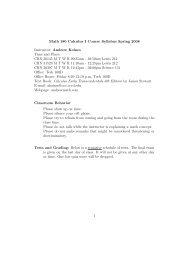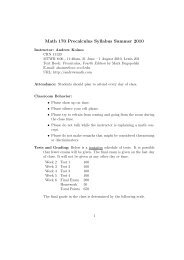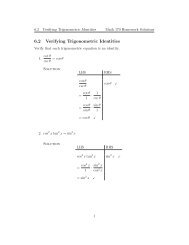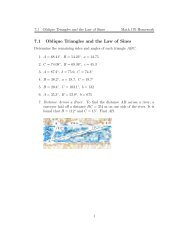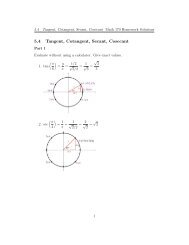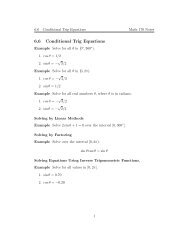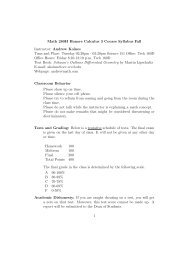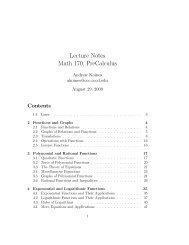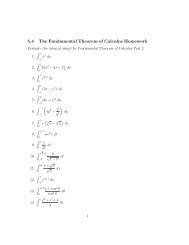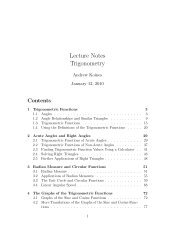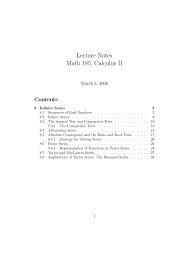Math 180 Calculus I Syllabus Spring 2012
Math 180 Calculus I Syllabus Spring 2012
Math 180 Calculus I Syllabus Spring 2012
You also want an ePaper? Increase the reach of your titles
YUMPU automatically turns print PDFs into web optimized ePapers that Google loves.
<strong>Math</strong> <strong>180</strong> <strong>Calculus</strong> I <strong>Syllabus</strong> <strong>Spring</strong> <strong>2012</strong><br />
Instructor: Andrew Koines<br />
Time and Place:<br />
CRN 31523 MTWR 11:10am - 12:25pm Lewis Center 212 ¡p¿ CRN 31530<br />
MTWR 9:35am - 10:50am Lewis Center 212¡p¿ Office: Lewis 204<br />
Office Hours: MTWR 9:00-9:30am, Friday 9:00-11:00am, 01/30-05/27<br />
Text Book: <strong>Calculus</strong> Early Transcendentals 7th Edition by James Stewart<br />
Webpage: andrewmath.com<br />
Classroom Behavior<br />
Please come to class on time.<br />
Please silence your cell phone.<br />
Please try to refrain from coming and going from the room during the<br />
class time.<br />
Please do not talk while the instructor is explaining a math concept.<br />
Please do not make remarks that might be considered threatening or<br />
discriminatory.<br />
Attendance If a student misses class during the first two weeks of the<br />
semester, then the student shall be dropped from the class.<br />
Contacting the Professor Students should speak to the professor in person<br />
when communicating with the professor. If a student uses email<br />
to communicate with the professor, then the student should use his or<br />
her OCC email account.<br />
Tests and Grading: Below is a tentative summary of the possible points in<br />
the class. It is possible that fewer tests will be given. The final exam<br />
is given on the Thursday of the last week of the semester. It will not<br />
be given at any other day or time.<br />
points<br />
Quizzes 50<br />
Chapter Tests 400<br />
Final Exam 200<br />
Total Points 620<br />
1
The final grade in the class is determined by the following scale.<br />
A 90-100%<br />
B 80-89%<br />
C 70-79%<br />
D 60-69%<br />
F 0-59%<br />
Tests: Students should plan to take tests and quizzes on the days on which<br />
they are scheduled. It is strongly recommended that students do not<br />
miss test or quiz dates. If a student misses a test or quiz and has a<br />
valid excuse as determined by the instructor, then a make up test or<br />
will be given during the last week of the semester. The make up test<br />
or quiz will be more difficult than the original test.<br />
Calculators: Calculators will not be allowed for tests or quizzes.<br />
Incompletes: There will be no incomplete grades given. If a student misses<br />
the final exam, then a grade of F will be given.<br />
Student Success Center The Student Success Center offers many free services<br />
for students. Tutors can help you with course concepts and study<br />
strategies for many subjects, including math. The Center offers both<br />
appointment and walk in assistance. It is located in Room 103 of the<br />
Classroom and Labs Building (under the blue clock tower.) For hours<br />
and further information stop by the center or visit their website at<br />
www.orangecoastcollege.edu/student services/student success center.<br />
Note on the Textbook: Students should also be able to use older editions<br />
of the textbook. There are homework assignments posted on the course<br />
webpage for the fifth and sixth edition. There are also typed course<br />
notes at andrewmath.com which have exercises at the end of each section.<br />
It is possible for a student to not buy the textbook and just<br />
use the online typed notes. The textbook, however, will be used for<br />
<strong>Calculus</strong> 2 as well as for <strong>Calculus</strong> 1.<br />
Academic Dishonesty: If you are caught cheating on a test, you will get<br />
a zero on that test. Moreover, this test score cannot be made up. A<br />
report will be submitted to the Dean of Students.<br />
An electronic copy of your completed exams will be made for my<br />
records.<br />
2
Gifts: All gifts will be returned.<br />
Topics Covered:<br />
Chapter 2 Limits and Derivatives<br />
Chapter 3 Differentiation Rules<br />
Chapter 4 Applications of Differentiation<br />
Chapter 5 Integrals<br />
Chapter 6 Applications of Integration<br />
Student Learning Outcomes: Students will be able to:<br />
1. Calculate limits when they exist, and if the limit does not exist,<br />
explain why it does not exist.<br />
2. Determine where a function is continuous, and explain why it is<br />
or is not continuous.<br />
3. Determine where a function is differentiable, and explain why it<br />
is or is not differentiable.<br />
4. Compute derivatives of polynomial, rational, algebraic, exponential,<br />
logarithmic, and trigonometric functions using the product<br />
rule, quotient rule, chain rule, and implicit differentiation.<br />
5. Find the equation of the tangent line to a curve given at a point<br />
if it exists. If it does not exist, explain why it does not exist.<br />
6. Compute the definite and indefinite integrals of polynomial, rational,<br />
algebraic, exponential, logarithmic, and trigonometric functions<br />
using the Fundamental Theorem of <strong>Calculus</strong> and the Substitution<br />
Method.<br />
7. Find the area under the curve of a continuous function on a closed<br />
interval.<br />
3



